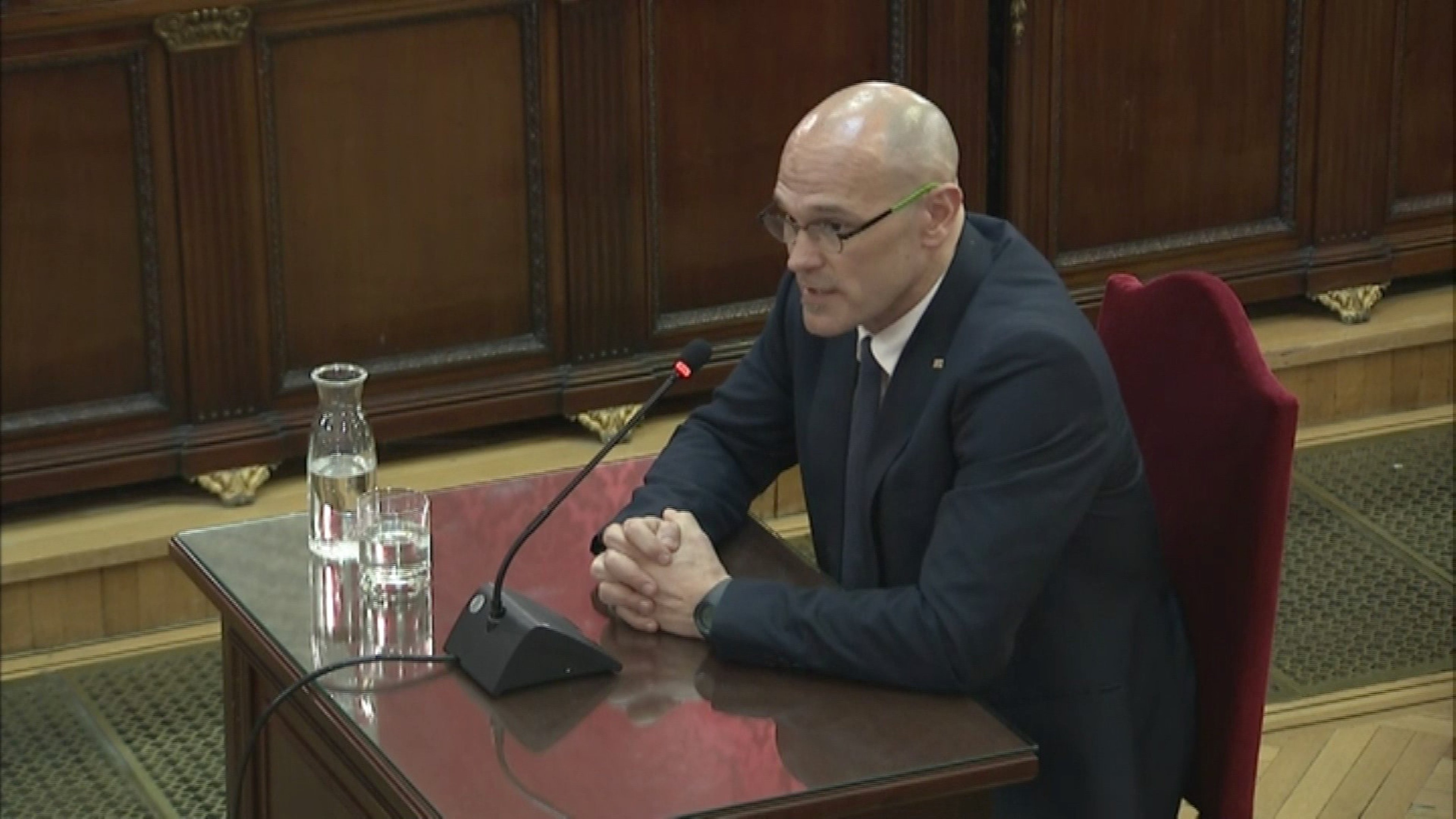"If anyone believes that the exercise of self-determination is a fantasy or an anecdotal idea, I'd tell them that there have been 106 self-determination referendums [around the world]. 54 have occurred since 1991. Of these, 26 were held without the state's consent, and the other 28 were held by the state. With that, I mean that the right to self-determination cannot be considered something anecdotic". That was how former Catalan foreign minister Raül Romeva started his testimony today during the Catalan independence trial in Spain's Supreme Court.
With a marked tone of a pro-European political speech (Romeva was an MEP for a decade), his testimony was centered on the guaranteeing of human rights and the right to self-determination. The latter, he noted, "is not explicitly prohibited by any international text".
"I define myself as a democrat, as a republican and Europeanist and I happen to be a supporter of Catalan independence," he said. Trying to explain the Catalan independence movement, he said that "it's not a project that is against anyone. It demonstrates values above a temporary circumstance".
The former foreign minister started his remarks as vice-president Oriol Junqueras did last week, saying "I consider myself to be a political prisoner" and ended his introduction saying that "it's difficult to conceive a reality like the one we're living through". Also taking his cue from Junqueras, he only replied to questions from his lawyer, Andreu Van den Eynde.
Romeva had comments for at least two of the groups of people he was facing. For the judges: "If we're here today it's because those who had to do politics didn't and passed the responsibility onto you. Don't accept this responsibility. Return it to where it shouldn't have left". And for far-right party Vox: "Those who are threatening Europe are sat among the prosecutions".
His career
Romeva suggested the start of the conflict came with the 2010 Constitutional Court verdict on Catalonia's new Statute of Autonomy: "it changed everything". Indeed, he said that was when he changed from being a supporter of federalism to a supporter of independence.
He also described his move to Catalan politics in 2015 after his time in Europe, when he was asked to head the list of candidates for Junts pel Sí in that year's Catalan Parliament election. "Every time I've stood for election, always, always, the electoral manifestos have contemplated the right to self-determination as a legal and legitimate objective, and always in my political life I've supported this right," he said.
Dialogue
"We've made more than 20 formal attempts asking for dialogue", he said in defence of the government's actions over his years of involvement, "in politics, to reach agreements, you have to speak".
Whilst Madrid has often said the Spanish Constitution prevents it from discussing questions like independence, Romeva said that "for those of us who understand that constitutions have to evolve as society evolves, dialogue strengthens their legitimacy". In Spain, however, he said "in 20 years we haven't touched a comma".
Referring to the unofficial 2014 independence referendum, he said "it was a clear indicator that we have to confront this reality and not that it has to disappear because there are those who don't like it, not that it will disappear because there are those it makes uncomfortable".
Violence
Like all his colleagues who have already testified, Raül Romeva has denied the accusations of violence in the independence movement: "Emphatically not. We've never incited any violence at all". He claimed that "objectives pursued with violence are only successfully attained 26% [of the time]" and that, as such, "it's more probable we reach our objective if we don't use violence".
At the same time, he denounced the violence used by police against the 2017 referendum. Asked by Van den Eynde if he saw violence that day, he replied: "I saw violence, obviously I did. That used incomprehensibly and unjustifiably by the state's security forces. Regrettably, there was violence. Something which it will take us a long time to forget".
With regards to the public's response, he said: "I saw on the part of the public a civic and peaceful determination to vote. And a passive resistance in the face of the violence. What that resistance caused was an enormous quantity of public victims. There were almost 1,000 people with contusions, something which contrasts strongly with the narrative public prosecutors gave the first day and which is a fairly large stain on the history of Spanish democracy".
As for the charge of rebellion, defined in Spanish law as requiring a "tumultuous uprising", he said that "protesting isn't rising up. Democracies have to guarantee the right to protest even when it is against them". "Everything we did from the government was public, we couldn't organise a popular revolt".
Enfocats
Asked about Enfocats, a document claimed by prosecutors as one of their key pieces of evidence, he said: "I never saw it, nor do I know anyone who had seen it". He added that "I can't avoid thinking that if the basis of the prosecution is on Enfocats, it's very fragile".

